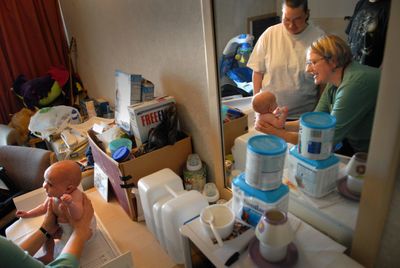Nurses see results of personal touch
Program is now assisting 91 families

While politicians wrestle with a multibillion-dollar rescue of Wall Street, a young Spokane family living in a Third Avenue motel room tries to make it on $8.50 an hour.
Thanks to a program that connects nurses with vulnerable first-time mothers, the family’s chances of raising a healthy child in a stable environment are greater. And a year after its launch, the Nurse Family Partnership is growing – and seeing results.
Sarah Parker’s welfare check stopped when her baby’s father, Brandon Searles, got a full-time job as a dishwasher.
Their bailout came about three months before their son, Stewart, was born, when public health nurse Jan Bostian came to visit for the first time. Stewie is now 2 months old, and Bostian still regularly checks on his health and welfare.
“They’re doing a very good job under stressful circumstances,” Bostian said of the couple.
Parker and Searles, both in their 20s, and their son are among 25 families Bostian visits under the program administered by the Spokane Regional Health District. She and four other registered nurses currently see 91 Spokane families, including 36 babies so far.
The program’s five-year goal is for eight nurses to see 25 families each.
In 2007, a coalition of community groups received federal funding for the program, which has a record of good results nationwide, according to Susan Schultz, program director.
Research has shown that babies born to families in the program are healthier, suffer fewer childhood injuries and are better prepared for school. Their mothers have fewer subsequent pregnancies and a better chance of getting a job.
Children whose families are in the program are less often abused, neglected or arrested by the time they’re 15.
All this adds up to an estimated $5 in future savings to the community for every $1 spent on the Nurse Family Partnership now.
On Tuesday, Bostian visited the Parker-Searles family in their cramped quarters, where wallpaper has started to curl away from the motel room walls but there is a fourth-floor view of downtown. Formula and diapers were stacked in the corners, and Stewie sat comfortably in a baby swing.
“Tell me how his feedings are going,” Bostian said.
On her last visit, she determined the baby, born weighing 5 pounds and 12 ounces, was gaining weight too rapidly – a rate of a pound a week. This visit, Bostian weighed and measured Stewie and found him to be a satisfactory 10 pounds, 4 ounces.
Then she gauged Stewie’s motor skills, while asking Parker about the baby’s development. What sounds does he make? How does he hear? When does he smile?
Bostian said many of her clients do not know “the basics of baby care,” such as how to tell when a child is sick or what to expect at different stages of development.
“I like her coming around,” Parker said of Bostian.
When her baby had colic, she said, she wouldn’t have known what the problem was without the nurse. Both of Parker’s parents are dead, and her nearest relatives live in Idaho.
“So I really don’t have anybody,” she said.
The family’s short-term goals include finding better housing. Down the road, they would like to leave Spokane, where good jobs have proven hard to find.
The Nurse Family Partnership is one program offered by the community largely as a result of the communitywide Our Kids: Our Business effort to reduce child abuse and neglect. Participants can also take part in a five-year Washington State University research program known as “Summer’s Project,” named for Summer Phelps, a Spokane child who died as a result of child abuse.
Participants in the Nurse Family Partnership are assigned to one or both of two other programs – the Spokane Child Abuse and Prevention Center’s fatherhood services and Catholic Charities’ relationship building services.
Data collected for the Nurse Family Partnership in Spokane reveal a community in need.
More than half the families involved earn less than $9,000 a year. Forty-five percent of the Spokane County families are on Temporary Assistance to Needy Families, compared with 19 percent in Washington and 6 percent nationally.
Bostian, who has worked for the Spokane Regional Health District for nine years, said she has seen the socioeconomic conditions of her clients deteriorate in that time. She perceives more poverty, mental health problems, domestic violence and drug use than when she started.
Yet the public health nurse also sees reasons for hope.
“Many of our families have come out of (Child Protective Services) themselves,” Bostian said, “and as parents they want to break that cycle.”